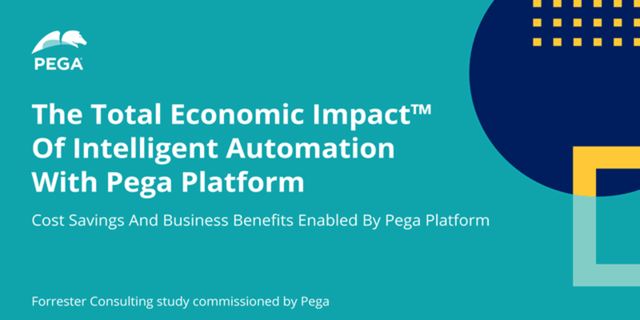Digital transformation isn’t a new term these days. In fact, according to Forrester Consulting, competing in the age of the customer means transitioning to a digital business.
At ING Wholesale Banking, adopting digital-first strategies has enabled the firm to do just that – create positive customer experiences while evolving the way they do business.
Ten years ago, ING experienced what many large-scale organizations still face today: legacy tooling and applications, as well as disconnected and manual processing that negatively impacted customer service. With a focus on customer experience, the company knew it needed a change.
That’s when ING selected Pega as its standard for workflow automation – an essential tool for the company to transform its customer experience.
"Pega orchestrates the whole customer journey, and there's been a lot of positive results from implementing intelligent automation," said Tim Ummels, central product owner of Pega at ING. "Processing times have decreased, which results in happier customers. We're also able to take advantage of Pega's out-of-the-box functionality like audit trails and reporting capabilities, which help support a lot of regulatory demands."
New Forrester study quantifies the value of standardizing on an intelligent automation platform
ING isn’t the only company realizing the value of standardizing on Pega for digital transformation initiatives. Pega recently commissioned Forrester to conduct a Total Economic Impact™ (TEI) study to examine the potential return on investment (ROI) enterprises may realize by deploying the Pega Platform as the backbone of their transformation initiatives to becoming digitally modern organizations.
Forrester interviewed eight decision-makers from five organizations and surveyed 125 decision-makers with experience intelligently automating with Pega throughout their organizations. Using Pega capabilities – from digital process automation, robotics process automation (RPA), task mining, and end-to-end workflow automation via case management, business rules, and AI-powered decisioning – these organizations streamlined and automated business processes while achieving both hard and soft ROI.
According to the Forrester study, here are the top eight benefits achieved by these organizations:
- Increase in back-office operational efficiency
Organizations realized up to a 45% increase in back-office operational efficiency due to the Pega Platform’s baseline automation capabilities, and the introduction of robotic process automation (RPA) and task mining over three years. Users were enabled to be more productive in their day-to-day responsibilities through process automation and improved insights. - Improved IT efficiencies
By standardizing on the Pega Platform, organizations said they experienced a variety of IT-related benefits. This includes the reduction of development timelines and IT burden as well as the ability to retire legacy software solutions, eliminating license fees and the time and effort previously spent maintaining these technologies. - Time savings in the contact center
On average, interviewed organizations realized a 70% reduction in time spent on non-value-add tasks and a 20% reduction in average handle time (AHT) over three years within the contact center. These productivity gains were achieved through process automation and insights generated with task mining. - Compliance, regulatory, and audit savings
Those surveyed experienced fine avoidance and compliance team productivity savings by standardizing on the Pega Platform for workflow automation. As a result, organizations reported improved transparency and tracking abilities for compliance teams. - Increased visibility
Pega enabled interviewed organizations to gain new insights into their business processes by providing a more expansive view into enterprise operations. These companies were able to use the data to further enhance performance, impact business decisions, and improve data traceability. - Better customer and employee experiences
With Pega, organizations could optimize both business processes and employee performance, leading to both faster and better-quality responses to customer needs. This resulted in reduced customer frustration and contributed to top line and loyalty.In addition, through personalized training and guided experiences based on task mining insights and the automation of mundane tasks, interviewees reported environments in which they felt supported and were able to spend more time on true knowledge work – increasing employee satisfaction and retention rates.
- Closer collaboration between business and IT
Because of Pega’s low-code capabilities, organizations were able to change the composition of their delivery teams from being IT-centric to more balanced between business and IT. By involving business users in the development process, IT teams became more responsive to business needs, and as a result, developed better solutions faster. - Re-imagined organizational structures while avoiding the wrong technical decisions
By intelligently automating with Pega, these organizations could capitalize on their visions of becoming more digitally modern; standardizing on Pega enabled them to restructure and further optimize their businesses.These new organizational structures also reap the benefits of improved transparency – an area in which interviewees said they can now make more evidence-backed decisions in ways that decrease rework and improve time to value. They now avoid making decisions that could increase effort and costs in the long run.
Businesses are investing in intelligent automation to help maximize value, simplify service, and boost efficiency
At ING, the company has experienced benefits like those discussed in Forrester’s TEI Study first-hand. Since standardizing on the Pega Platform in its Wholesale Banking division, the company has built more than 70 workflow automation solutions that provide a full digital experience for client onboarding in eight countries with expansion planned in 10 others.
In the future, ING plans to continue leveraging Pega’s reusable components to drive more ROI throughout multiple client journeys.
“We have improved out time to market with reuse,” Ummels said. “New customer journeys are benefiting from these reusable components, and as a result, ING is accelerating.”

